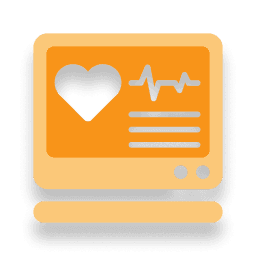Booking inThane
Cart
ECG
An electrocardiogram (ECG) is a non-intrusive medical examination that captures the heart's electrical activity during a designated time frame. Electrodes are attached to the skin, and the resulting ECG waveform graphically represents the heart's rhythm and function. This diagnostic tool is crucial for detecting irregularities such as arrhythmias, ischemia, and other cardiac conditions. ECGs provide valuable information for healthcare professionals in assessing heart health, guiding treatment decisions, and monitoring cardiac function. The test is quick, painless, and widely used in various medical settings to evaluate and manage cardiovascular issues.
Available packages in Thane (1)
DIGITAL ECG
Also Known as Digital Electrocardiogram
Aarthi Scans and Labs
₹250
Popular Tests
Browse by Categories
Full Body Checkups
Overall health diagnosis
Body Organs
Assess major organ function
Lifestyle Habits
Measure habits, empower health
X-Ray, MRI & Scans
Radiology based lab tests
What is an ECG test?
An ECG (Electrocardiogram) test is a medical procedure that measures the electrical activity of the heart. It records the heart's rhythm and detects any abnormality in its function. This non-invasive test provides valuable information about the heart's health, helping doctors in the diagnosis and monitoring of various cardiac conditions.
Who needs an ECG test?
- Your doctor might ask you to take the ECG test for several medical conditions, including: - Chest pain or discomfort - If you are experiencing symptoms of heart disease like shortness of breath, palpitations, or fainting - Evaluation of heart conditions, such as arrhythmias (abnormal heart rhythms), heart attacks, or heart valve diseases - Assessment of risk factors for heart disease, like high blood pressure, high cholesterol, or diabetes - Pre-operative evaluation before certain surgeries - Monitoring the effectiveness of cardiac medications or pacemakers
How does an ECG test work?
An ECG test works by placing small, adhesive electrodes (Upto 12) on the skin of the chest, arms, and legs. The electrodes are connected to a machine which records the electrical signals produced by the heart. The machine translates these signals into a graph-like pattern called an electrocardiogram. The pattern provides information about the heart's rate, rhythm, and electrical activity, which help doctors understand your heart health.
Preparation for an ECG test:
Inform your doctor about all the supplements, medications, or herbal remedies you are taking. - It is better to wear loose-fitting clothing that allows easy access to the chest area. - Avoid applying lotions, oils, or creams on the chest before the test, as they can interfere with electrode placement. - If you have a lot of hair on your chest, the technician might have to shave small areas to ensure proper electrode contact.
Benefits and risks of ECG tests:
Benefits: - Quick, non-invasive, and painless procedure - Doctors can get valuable information about the heart's electrical activity - Helps in the diagnosis and monitoring of various cardiac conditions - Helps doctors to assess the risk of heart disease and plan appropriate treatment Risks: - ECG tests are generally safe and carry minimal risks. - In rare cases, some individuals may experience skin irritation or allergic reactions to the electrode adhesive. It is important to inform the technician if you have a known allergy.
What to expect during and after an ECG test:
1. You will be asked to lie down on an examination table. 2. The technician will clean the areas where the electrodes will be placed, and they will attach the electrodes using adhesive patches. 3. The electrodes are connected to the ECG machine through wires. 4. The machine will record the electrical signals produced by your heart for a few seconds to several minutes. 5. You should remain still and avoid talking during the test to minimize interference. 6. After the test, the electrodes will be removed, and you will be able to resume your normal activities.
ECG Price in Thane
Provider Name | Price |
Aarthi Scans and Labs centre for ECG | ₹250 |
Frequently Asked Questions
What does an ECG test measure?
The test is used to measure the electrical activity of the heart, including the heart's rate, rhythm, and the time it takes for electrical signals to travel through the different parts of the heart.
How long does an ECG test take?
An ECG test typically takes about 5 to 10 minutes, depending on the type of ECG being performed.
Can I eat or drink before an ECG test?
Yes, you can eat and drink normally before an ECG test. However, it is best to avoid consuming excessive amounts of caffeine or energy drinks that can affect your heart rate.
Can ECG testing detect all types of heart conditions?
ECG testing can detect a number of heart conditions, including abnormal heart rhythms, heart attacks, and certain structural abnormalities. However, it may not detect all cardiac conditions, and your doctor might ask you to take additional tests for a comprehensive evaluation.
Can I perform ECG testing at home?
While portable ECG devices are available for home use, it's important to consult with your doctor and take the test under healthcare professionals’ supervision for accurate interpretation and guidance. Home ECG devices are not a substitute for medical evaluation by a qualified healthcare provider.
How often should I undergo ECG testing?
The frequency of ECG testing depends on the following factors - Medical condition, Symptoms, Risk factors. Your doctor will decide the appropriate timing and frequency of ECG tests based on your individual needs.
Will I receive the ECG test results immediately?
Yes. In many cases, the ECG test results can be interpreted immediately after the test, and the doctor will discuss the findings with you. However, for more complex cases or when further analysis is required, it may take some time to receive the results.
